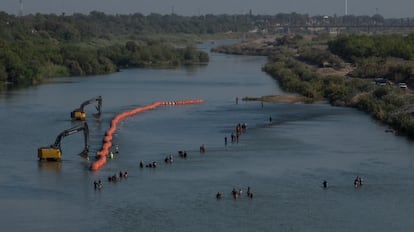A judge will consider if Texas can keep its floating barrier to block migrants crossing from Mexico
Both the Biden administration and Mexico want the barrier removed. The Justice Department has accused Texas of unlawfully putting the buoys on the international boundary

A federal judge on Tuesday will consider whether Texas can keep a floating barrier on the U.S.-Mexico border as both the Biden administration and Mexico push to remove Republican Gov. Greg Abbott’s latest hard-line measure to deter migrants from crossing.
The scheduled hearing in Austin comes days after Texas, which installed the water barrier on the Rio Grande in July near the border city of Eagle Pass, repositioned the wrecking ball-sized buoys closer to U.S. soil. Texas is being sued by the Justice Department, which argues the barrier could impact relations with Mexico and pose humanitarian and environmental risks.
During a trip Monday to Eagle Pass, Abbott said the barrier was moved “out of an abundance of caution” following what he described as allegations that they had drifted to Mexico’s side of the river.
“I don’t know whether they were true or not,” Abbott said.
It is not clear when U.S. District Judge David Ezra might rule on the barrier.
In the meantime, Abbott’s sprawling border mission known as Operation Lone Star continues to face numerous legal challenges, including a new one filed Monday by four migrant men arrested by Texas troopers after crossing the border.
The men include a father and son and are among thousands of migrants who since 2021 have been arrested on trespassing charges in the state. Most have either had their cases dismissed or entered guilty pleas in exchange for time served. But the plaintiffs remained in a Texas jail for two to six weeks after they should have been released, according to the lawsuit filed by the Texas ACLU and the Texas Fair Defense Project.
Instead of a sheriff’s office allowing the jails to release the men, the lawsuit alleges, they were transported to federal immigration facilities and then sent to Mexico.
“I think a key point of all that, which is hard to grasp, is also that because they’re building the system as they go, the problems flare up in different ways,” said David Donatti, an attorney for the Texas ACLU.
Officials in both Kinney and Val Verde counties, which have partnered with Abbott’s operation, are named in the lawsuit. A representative for Kinney County said Monday he did not believe anyone had yet reviewed the complaint. A representative for Kinney County did not immediately return an email seeking comment.
The lawsuit also alleges that there were at least 80 others who were detained longer than allowed under state law from late September 2021 to January 2022.
Abbott was joined at the border Monday by the Republican governors of Iowa, Nebraska, Oklahoma and South Dakota, all of whom have sent their own armed law enforcement and National Guard members to the border.
Sign up for our weekly newsletter to get more English-language news coverage from EL PAÍS USA Edition
Tu suscripción se está usando en otro dispositivo
¿Quieres añadir otro usuario a tu suscripción?
Si continúas leyendo en este dispositivo, no se podrá leer en el otro.
FlechaTu suscripción se está usando en otro dispositivo y solo puedes acceder a EL PAÍS desde un dispositivo a la vez.
Si quieres compartir tu cuenta, cambia tu suscripción a la modalidad Premium, así podrás añadir otro usuario. Cada uno accederá con su propia cuenta de email, lo que os permitirá personalizar vuestra experiencia en EL PAÍS.
¿Tienes una suscripción de empresa? Accede aquí para contratar más cuentas.
En el caso de no saber quién está usando tu cuenta, te recomendamos cambiar tu contraseña aquí.
Si decides continuar compartiendo tu cuenta, este mensaje se mostrará en tu dispositivo y en el de la otra persona que está usando tu cuenta de forma indefinida, afectando a tu experiencia de lectura. Puedes consultar aquí los términos y condiciones de la suscripción digital.








































